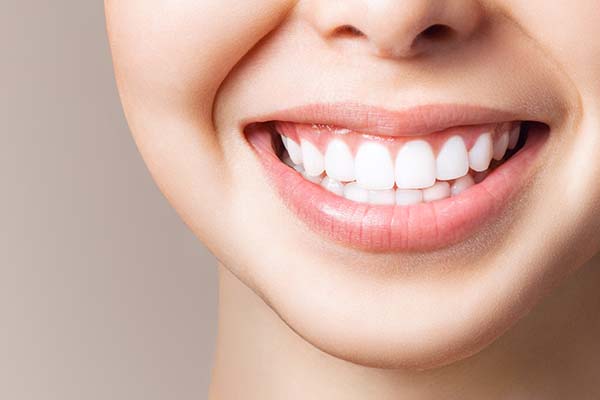Can Teeth Be Sensitive After Teeth Whitening?

Professional teeth whitening is a safe and effective way to remove stubborn stains and improve the appearance of your smile. However, it can cause a temporary side effect called dentinal hypersensitivity. This can cause your teeth to react with discomfort to foods that are acidic, sweet, or sour or to temperatures of hot and cold.
Dentinal hypersensitivity from whitening is usually temporary and resolves after a few days. In the meantime, there are things you can do to help keep it under control.
What causes sensitivity after teeth whitening?
Each tooth contains microscopic channels that start at the surface of the enamel and extend down to the nerves at the center of the tooth. These channels are called dentinal tubules. The reason that teeth whitening agents work so well is because they can penetrate deep down into the enamel. As a result, they sometimes get into the dentinal tubules and irritate the nerves within the tooth.
This is the most common cause of sensitivity from teeth whitening. It can also occur because of irritation of your gums when the bleaching gels come in contact with them. If your dentist uses whitening trays that you bite down into, teeth may become sensitive due to the pressure exerted on them during the whitening process.
What can you do about sensitivity from teeth whitening?
There are things that you can do before the treatment to help reduce sensitivity. If you still experience symptoms following the treatment, there are things you can do to lessen those symptoms.
What to do before treatment
Starting a week to 10 days prior to your appointment, you can brush your teeth with a desensitizing toothpaste. This has ingredients that help to block pain signals at the surface of the tooth from reaching the nerves at the center. It may also cover up the tubules, blocking the bleaching agents from reaching the nerves.
Just prior to treatment, you can apply a desensitizing gel to your teeth. Follow the directions provided on the package for applying the gel and then rinsing it off with water.
What to do after treatment
You can continue to use toothpaste for sensitive teeth for brushing after your whitening treatment. Be sure to use a soft-bristle brush to avoid any damage to the enamel. Fluoride is a mineral that helps to build up tooth enamel, so use dental hygiene products that include it to help to build your teeth back up more quickly after whitening. Use lukewarm water rather than cold to brush your teeth and rinse your mouth.
For the first few days after teeth whitening, choose foods and drinks that you can enjoy at room temperature and avoid any foods that are too sugary or acidic. If this is not possible, you can prevent potentially irritating beverages from reaching your teeth by sipping them through a straw.
Conclusion
It is normal to experience some sensitivity following teeth whitening. This is temporary and usually goes away within a few days. You can try desensitizing toothpaste prior to treatment to try to prevent the sensitivity, and there are several steps you can take after the treatment to reduce the symptoms until they resolve completely.
Request an appointment here: https://bergenerdental.com or call Hackensack Emergency Dental and Implant Center at (201) 620-9644 for an appointment in our Hackensack office.
Check out what others are saying about our dental services on Yelp: Teeth Whitening in Hackensack, NJ.
Related Posts
A general dentist will tell you that the habits you develop play a vital role in the quality of your long-term oral health, and good daily habits can significantly reduce the risk of cavities, gum disease and other common oral health concerns. By understanding the most effective habits and making an effort to implement them…
A damaged dental crown can disrupt daily life and put the underlying tooth at risk for further complications. When a dental crown chips, loosens, or breaks entirely, prompt action can help prevent discomfort, infection, or more extensive dental work. Understanding the proper steps to take ensures the best chance of preserving oral health and restoring…
Dental bonding is an efficient way to restore the appearance and function of teeth. Your cosmetic dentist can use this to repair any damage, discoloration, or decay. Cracked, chipped, broken, or stained teeth can look new. This type of treatment can also close gaps between teeth. If you want to know how dental bonding works…
Tooth replacement is an essential part of modern dentistry, particularly for those who have lost one or more teeth due to injury, decay, or other health-related issues. A cosmetic dentist offers a variety of options that restore oral function and improve the appearance of your smile. When you choose the right tooth replacement method to…
